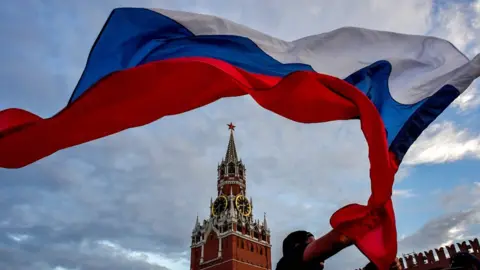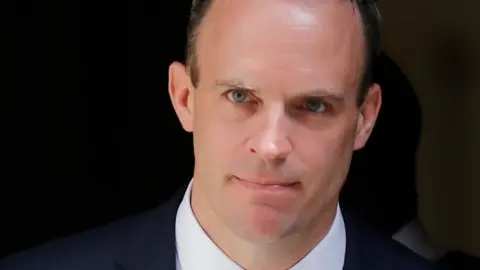Curious timing of Russian meddling claims

 AFP
AFPWhen you have picked your jaw up from the floor after the revelations hackers working for the Russian state are believed to have been trying to steal research into a vaccine that could combat the spread of the deadly coronavirus, it's worth knowing that attempts at interference do not stop there.
Those actions - described as "despicable" by the government - are believed to have targeted, not just UK scientists, but those from Canada and the US as well.
And it's clear, even from the rather technical public statements from security leaders, that the UK government believes the Kremlin itself was involved.
This is not a group of hackers working out of their parents' garage. The group thought to be responsible - APT29 - is one of those previously linked to hacks on the US Democrats in 2016.
And the UK government is confident the attacks were known about at the highest level of the Russian state.
Ministers also chose today, though, to confirm already widely held suspicions that Russian "actors" separately tried to interfere in the UK election last year.
This accusation is not explicitly against the Russian state, but those shadowy figures who "amplified" leaks of government documents during the 2019 campaign, which were then used by the Labour Party to make claims against the Tories.
'Amplifying actors'
It seems a lifetime ago, but one of Labour's central mantras against Boris Johnson was that the NHS would be "up for sale" in a trade deal with the Americans. You might remember hearing the chant at numerous events - "Not for sale! Not for sale!"
At one of those campaign events, Jeremy Corbyn dramatically unveiled leaked documents that he alleged proved this to be the case.
Labour supporting doctors and nurses wearing scrubs even handed out the reams of paper.
The papers did show that the US wanted access to the NHS, but they did not categorically prove that the Tories would go along with it.
In any case, there was widespread suspicion about where the hundreds of pages had come from, after they had first appeared on the website Reddit.
Foreign Secretary Dominic Raab has not claimed today that Russian influences stole the documents.
But he has accused them of "amplifying" the claims online, condemning these attempts at interfering in the UK's democratic process as "completely unacceptable".
It's important to say too that Labour has also slammed the Russians' apparent role.
Explicit link
It's not a secret that there have been attempts by Russia to interfere in what happens on UK soil - most dramatically, of course, with the Novichok attacks.
And the culture select committee found some evidence of media aligned with the Kremlin spreading anti-EU messages during the EU referendum.
Rumours and allegations have swirled about Russian attempted influence for years, although the extent of what has gone on has never been clear.
Despite many suspicions of attempts at meddling in the referendum and other campaigns, significant concrete evidence is in short supply.
That's one of the reasons why, until today, UK ministers have stopped short of saying that political interference has happened here.
So, it matters that this is the first time a UK minister has made an explicit link to Russia, in one way or another, trying to meddle in elections in the UK.
But the timing of that statement creates its own intrigue too.
 Getty Images
Getty ImagesNext week, at long last, the powerful group of MPs who monitor UK intelligence will publish a report on the Russian threat to the UK - a report that has been anticipated for a very long time and may perhaps set the record straight on all of this.
It's been produced by an independent committee who are able to access and interrogate intelligence information.
The report was completed many months ago, and while No 10 has continually denied there is anything fishy, it has been sitting on the prime minister's desk for a long time.
The Tories' attempts to install a loyal chairman of the committee backfired spectacularly yesterday, which you can read about here.
Now, the report itself, which looks at the spectrum of the threat that Russia may pose to the UK - the financial influence of wealthy Russians in the country, what happened in Salisbury, attempts at meddling in political campaigns and more - will be published next week.
No 10's timing
Is it politically convenient for ministers to acknowledge the threat themselves just before others may make embarrassing claims about it?
Labour politicians have frequently accused the Conservatives of ignoring Russian interference because of their relationship with Tory Party donors.
Did it suit the government to publicise the claims that material used by Labour was also manipulated by Russia?
It seems, as one former UK ambassador to Moscow said this afternoon, a "remarkable coincidence" that the government decided at this moment to admit explicitly, for the first time, that Russia has tried to stick its nose into our politics - especially when there is a running criminal investigation into who obtained the documents to start with.
But Downing Street denies that there is any link in the timing at all.
Whatever shenanigans there may have been about the timing of these announcements, it is clear there is cause to be anxious about Russia's attitude to the UK.
Boris Johnson once hoped, as foreign secretary, that he could reset the UK's relations with Vladimir Putin.
Today's evidence suggests that what he did get right was his own later admission that he was wrong.
